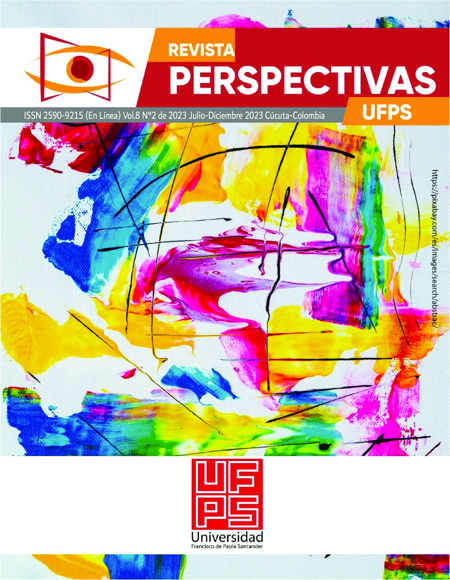Proyecto ambiental escolar- Prae como contribución a la cultura socio-ambiental del megacolegio la frontera del municipio de villa del rosario norte de santander
The school environmental project - PRAE as a contribution to the socio-environmental culture of the Megacolegio La Frontera of the Municipality of Villa Del Rosario Norte de Santander.
Main Article Content
This research seeks to contribute to the construction of socio-environmental culture from the perspective of the PRAE of the Megacolegio La Frontera de Villa del Rosario through a multimedia strategy that allows to dynamize its integral formation. Research question: Is there Articulation of the PRAE with the PEI of the Educational Institution or is it isolated? What are the potentialities or strengths of the PRAE, in relation to the problems of the locality? Objective: i) To contribute to the construction of socio-environmental culture from social communication in perspective of the School Environmental Project-PRAE of the Megacolegio La Frontera de Villa del Rosario through a multimedia strategy that allows to dynamize its integral formation. Methodology: For this research a qualitative approach was carried out since the objective is to contribute to the construction of socio-environmental culture from social communication in perspective of the PRAE of the Megacolegio La Frontera de Villa del Rosario through a multimedia strategy that allows to dynamize its integral formation. Results: The methodological results expose the realization of the objectives to an affected population, from the socio-cultural spheres in such a way that it allowed to determine the causes, the advances and the scope on the study area. Conclusions: The potentialities and weaknesses of the PRAE are identified, the weaknesses and environmental potentialities leave a positive and negative impact of them not only on natural systems, but also on social systems.
Downloads
Article Details
Betancourt, D. F. (09 de agosto de 2016). Cómo hacer un árbol de objetivos: Ejemplo práctico. Recuperado el 23 de mayo de 2020, de Ingenio Empresa: www.ingenioempresa.com/arbol-de-objetivos
Betancourt, D. F. (23 de febrero de 2017). Marco lógico: Definición, elaboración y ejemplo detallado. Recuperado el 23 de mayo de 2020, de Ingenio Empresa: www.ingenioempresa.com/metodologia-marco-logico
Blanco, B., Alicia Peña Cortés Oswaldo Cuadro Franco, C., Noreña Ortega Ricardo Molano Carrera, M., (2016). Proyectos Ambientales Escolares PRAE.http://www.minambiente.gov.co/images/OrdenamientoAmbientalTerritorialyCoordinaciondelSIN/pdf/VII_Encuentro_Nacional_de_Educación_Ambiental/PRAE.pdf.
Camacho, H., Camara, L., Cascante, R., Sainz., Héctor. (2001) El Enfoque del marco lógico: 10 casos prácticos. Cideal, Madrid. Recuperado el 05 de septiembre de 2017 de http://www.olacefs.com/wpcontent/uploads/2014/07/DOC_27_8_2013_Enfoque_Marco_Logico_EML_10_casos.pdf
Carabaza González, J. (2006). Apuntes para comprender la cultura ambiental desde la comunicación. Global Media Journal México, 3(6), 6.
Carrazco, M. T. (2002). Reflexión y acción: el diálogo fundamental para la educación ambiental Teoría y práctica. In Ministerio de Educación Nacional, Ministerio de Medio Ambiente.
CONTACTO (1982), El Programa Internacional de Educación Ambiental, París, Boletín de educación ambiental de UNESCO-PNUMA, vol. VII, año 3 (septiembre).
CONTACTO (1983), El Programa Internacional de Educación Ambiental, París, Boletín de educación ambiental de UNESCO-PNUMA, vol. VIII, núm. 4 (diciembre). Contacto (1986), Décimo aniversario del Programa Internacional de Educación Ambiental de UNESCOPNUMA 1975-1985, París, Boletín de educación ambiental de UNESCO-PNUMA, vol. X, núm. 1 (marzo).
CONTACTO (1989), Programa Internacional de Educación Ambiental 1986-1987, París, Boletín de educación ambiental de UNESCO-PNUMA, vol. XIV, núm. 4 (diciembre).
García, D., & Priotto, G. (2020). EDUCACIÓN AMBIENTAL Aportes políticos y pedagógicos en la construcción del campo de la Educación Ambiental. Guia Educacion Ambiental, 4, 221.
Gaudiano, E. G. (2009). La educación ambiental institucionalizada : actos fallidos y horizontes de posibilidad. Perfiles Educativos, XXXI.
Olguín, M., Bonilla, P., Pupo, A., & Lezaca, J. (2013). Guia metodológica para la formulación de proyectos ambientales escolares, un reto más allá de la escuela.
Hopenhayn, M. (2003). Educación, comunicación y cultura.
Ortegon, E., Pacheco, J. F., & Prieto, A. (2005). Metodología del marco lógico para la planificación, el seguimiento y la evaluación de proyectos y programas. Santiago de Chile: CEPAL. Recuperado el 20 de Noviembre de 2016, de http://repositorio.cepal.org/bitstream/handle/11362/5607/S057518_es.pdf
Paz, L. S. M., Avendaño, W. R. C., & Parada-Trujillo, A. E. (2014). Desarrollo conceptual de la educación ambiental en el contexto colombiano ISSN 1909-2474 No. 41, julio - diciembre 2015. Luna Azul, 39(2), 250–270. http://www.scielo.org.co/pdf/luaz/n39/n39a15.pdf DOI: https://doi.org/10.17151/luaz.2014.39.15
Ruiz Lugo, L. (2012). Formación integral: desarrollo intelectual, emocional, social y ético de los estudiantes. Revista Universidad De Sonora, 1, 11–13
Santos Calderón, J. M., Gilberto Murillo Urrutia Ministro Ambiente Y Desarrollo Sostenible Carlos Alberto Botero López Viceministro De Ambiente Y Desarrollo Sostenible, L. DE, Enrique Araújo Villar Yolima Isabel Peña González, T., Barahona Riascos, A., Lascarro Moya Eder Cristian Canoles Bustos Gloria Isabel Posada Saavedra, M., María Castrillón Paz Alid Armando Mera Mosquera Blanca Elsa Beltrán Quinayás Carlos Alfonso Cerón Benavides Nidia Lucía Girón Bucheli, A., Torres Carrasco, M., Proceso De Construcción, A. AL, Bustamante Bohórquez Profesor Titular Maestría en Comunicación-Educación Universidad Distrital Francisco José de Caldas Juan Moreno.
Servaes, J. (2012). Comunicación para el desarrollo sostenible y el cambio social. Una visión general. CIC Cuadernos de Información y Comunicación, 17(0). https://doi.org/10.5209/rev_ciyc.2012.v17.39256 DOI: https://doi.org/10.5209/rev_CIYC.2012.v17.39256
UNESCO (1989), Educación ambiental: módulo para la formación de profesores y supervisores en servicio para las escuelas primarias, Santiago de Chile, Oficina Regional de Educación de la UNESCO para América Latina y el Caribe, UNESCO-PNUMA, Programa Internacional de Educación Ambiental (Serie Educación Ambiental, 6).
UNESCO (1990b), Educación ambiental: módulo para entrenamiento de profesores de ciencias en servicio y de supervisores para escuelas secundarias, Santiago de Chile, Oficina Regional de Educación de la UNESCO para América Latina y el Caribe, UNESCO-PNUM A, Programa Internacional de Educación Ambiental (Serie Educación Ambiental, 8).
UNESCO (1997), International Conference on Environment and Society: Education and publicawareness for sustainability, Final report, Greece, 8 a 12 de diciembre, EPD-97/Conf.401/CLD.3
Utande Igualada, M. (1959). Una ley general de educación. Revista de Educación.







